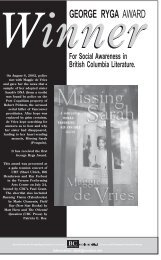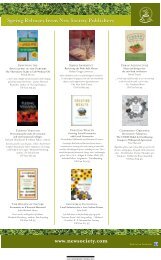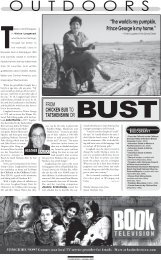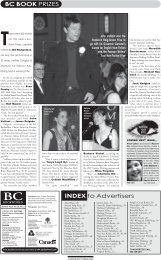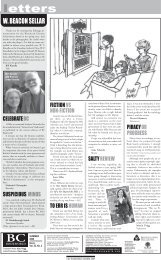Autumn 2011 Volume 25 - No 3 - BC BookWorld
Autumn 2011 Volume 25 - No 3 - BC BookWorld
Autumn 2011 Volume 25 - No 3 - BC BookWorld
You also want an ePaper? Increase the reach of your titles
YUMPU automatically turns print PDFs into web optimized ePapers that Google loves.
17 <strong>BC</strong> BOOKWORLD AUTUMN <strong>2011</strong><br />
reviews<br />
Sleep, You, A Tree by E.D. Blodgett<br />
(University of Alberta Press $19.95)<br />
SEA GAZING IS MUCH LIKE GAZing<br />
at lilacs, the moon, and<br />
apple trees in blossom or<br />
a familiar field in snow. It’s always<br />
the same and always different.<br />
This same is not “same old<br />
same old;” that would be boring.<br />
This gazing is a new “same old”<br />
and that induces trance states.<br />
E.D. Blodgett would understand.<br />
His new collection of<br />
unrhymed sonnets, Sleep, You, A<br />
Tree, is a long contemplation in<br />
seventy-eight parts—with repeated<br />
motifs that include infinity,<br />
eternity, silence, unsayability,<br />
darkness, whiteness,<br />
childhood, paradise,<br />
God, moon and stars—<br />
in which almost every<br />
poem includes a tree.<br />
Blodgett’s weaving<br />
of form and content is<br />
rare in contemplative<br />
poetics. “And so the colour<br />
of the air is the colour<br />
of the sea when it in absolute transparency<br />
wells up before our eyes, the<br />
clouds the only waves, and all that<br />
comes in sight is what eternity holds<br />
up, the sound of it inaudible and<br />
lapping at our skin.”<br />
Blodgett’s rhythms, both formal<br />
as in traditional sonnets but<br />
also relaxed in their line ends<br />
and break-up of rhythm, are delicious<br />
to the ear. Such poetry is<br />
made to be read aloud. When<br />
read silently off the page, these<br />
pieces have a tendency to blur.<br />
They are so alike in their softedged,<br />
gentle ruminations that<br />
a reader could be excused for<br />
asking if she has not already read<br />
this one.<br />
It seems as if Blodgett has<br />
used the same hundred words<br />
for every poem. He held the<br />
words in his hand, scattered<br />
them and then made a new<br />
poem out of their different arrangements.<br />
It’s a legitimate way<br />
of poem making … if the poet<br />
has no intent for linear sense.<br />
“If God / is everywhere, then he<br />
is here in this passage where you have<br />
stopped / but it is God that is the<br />
simplest tree that bears the air alone<br />
/ above itself, and all that moves<br />
within its compass stands within the<br />
large divinity of all that passes.”<br />
What do such passages<br />
mean They are not rational nor<br />
are they childlike pre-rational.<br />
It is a different mind that can<br />
receive this kind of writing, a<br />
transrational mind. They are like<br />
kirtan chanting in Sanskrit of the<br />
sacred names.<br />
Mystical poetry is an elusive<br />
door. The content in Sleep, You,<br />
A Tree is not the point; rather it’s<br />
the effect that chanting produces.<br />
You either really get it or<br />
you don’t. The knowing is notknowing,<br />
the unknowability of<br />
divine things. When inner receptiveness<br />
is present, the<br />
“transported” state can be elicited<br />
in a moment by a phrase.<br />
Of course, there is the irony<br />
of a poet saying skillfully how<br />
unsayable are these things: infinity,<br />
paradise, death and the<br />
tears of God. A reader who is<br />
looking for specificity, the name<br />
of the bird, or the star, will be<br />
Hannah<br />
MAIN-VAN DER KAMP<br />
THE DIVINITY OF ALL THAT PASSES<br />
frustrated. There isn’t a single<br />
hard edge in this collection.<br />
For some readers the repeated<br />
petals falling or wind<br />
over snow will seem too bland,<br />
but mystics, contemplatives and<br />
dreamers will find this lack of<br />
substance appealing.<br />
In Drifting, a poem ostensibly<br />
about lilacs, Blodgett allows their<br />
scent to drift him into memory:<br />
“How can we breathe without the<br />
breath of childhood, the cries / that<br />
rush among the leaves,<br />
their taking of the world,<br />
the stars that fill / their<br />
eyes, the innocence that<br />
sheathes their bodies,<br />
childhood that is / its own<br />
eternity where nothing enters<br />
but itself.”<br />
Blodgett, who won<br />
a Governor General’s<br />
award some years ago, has recently<br />
moved to the West Coast.<br />
Especially skilled at evoking<br />
childhood, he is a welcome addition<br />
to the B.C. poetry scene.<br />
978–0-88864 554 8<br />
The Song Collides by Calvin Wharton<br />
(Anvil Press $16)<br />
Mystical poetry is an elusive door in<br />
E.D. Blodgett’s Sleep, You, A Tree<br />
BY CONTRAST, THE SONG COLlides<br />
is a highly readable<br />
and accessible collection<br />
in which Calvin Wharton has a<br />
flair for the felicitous phrase.<br />
“The humming bird busy sewing up<br />
the morning light, birds lever out into<br />
the open sky, the jitterbug of insect<br />
wings, the subtraction that is autumn.”<br />
Wharton is a complete contrast<br />
to Blodgett. His work is<br />
humorous, mostly local and embodied<br />
whereas Blodgett is universal<br />
and ethereal. Wharton<br />
writes of real food (Chinese,<br />
with onions and black<br />
bean sauce), whereas<br />
there’s no mention<br />
of real sustenance<br />
in Blodgett.<br />
Whereas<br />
Blodgett is<br />
metaphysical<br />
about death,<br />
Wharton visits<br />
the palliative<br />
care<br />
ward with<br />
its masks<br />
and the<br />
tubes, “the<br />
lungs’ noisy<br />
dream of oxygen.”<br />
Whereas<br />
Blodgett’s serene<br />
words are<br />
those of an elderly<br />
sage, Wharton’s<br />
phrasing retains a<br />
youthful sparkle.<br />
This is not so much a<br />
E.D. Blodgett: infinity, paradise,<br />
death and the tears of God<br />
Proma Tagore: poetic outrage<br />
difference in chronological age<br />
as in perception. The world has<br />
room for both perspectives. One<br />
cannot know stillness unless one<br />
has been raucous.<br />
And again, trees…<br />
<strong>No</strong>t the seedy, pie-plate<br />
splat of shit on the lawn<br />
or the branch torn ragged<br />
from the yellow plum tree<br />
and left mangled, at the top<br />
of the driveway;…<br />
But this:<br />
the visitor himself, mid-day<br />
lumbering calm up the street<br />
toward the trees….<br />
Language Is <strong>No</strong>t the Only Thing<br />
That Breaks by Proma Tagore<br />
(Arsenal Pulp $14.95)<br />
978-1-897535-68-4<br />
TALKING UP CAUSES, A POET<br />
runs the risks of erasing<br />
poetry’s subtleties. At<br />
times, strong advocacy can result<br />
in some predictable lines.<br />
Born in India, Proma Tagore<br />
is a political poet in the overt<br />
sense of the term. She immigrated<br />
to Canada when she was<br />
four years old and is now active<br />
in anti-racist, feminist, queer<br />
and migrant justice organizing.<br />
In her first collection, Tagore<br />
explores takes on Big Subjects<br />
such as colonization, imperialism,<br />
globalization, capitalism and<br />
war, as well as the experience of<br />
immigration as a child (she was<br />
born in Kolkata), anti-racism,<br />
same gender loving and feminism.<br />
She almost succeeds to do<br />
so without sloganeering.<br />
Language Is <strong>No</strong>t the Only Thing<br />
That Breaks is recommended for<br />
readers who dwell on “higher<br />
things” and have lost their engagement<br />
with what really is: the<br />
broken things.<br />
From a poet whose first language<br />
is not English, a poet<br />
whose speech is “the hybridized<br />
tongue of immigrant children,”<br />
who breaks up the language<br />
when it cannot express the<br />
depths of grief, this is a notable<br />
first book of poems.<br />
Best of all, Proma Tagore<br />
shows how a skilled poet can<br />
convey outrage without losing<br />
poignancy or tenderness.<br />
“You are mistaken for the armour<br />
you’ve become but don’t know<br />
how to carry…”,<br />
“… skin worn from keeping<br />
too much quiet”<br />
978-1-55152-399-6<br />
Gazing at tides, Hannah Main–<br />
van der Kamp, whose first language<br />
is not English, trances out<br />
on the Upper Sunshine Coast while<br />
keeping a sharp eye for real bears.<br />
Calvin Wharton: retains<br />
a youthful sparkle<br />
POETRY<br />
Cornelia<br />
Hoogland:<br />
saying yes to<br />
the wolf<br />
SEEING RED<br />
BY KARA A. SMITH<br />
Woods Wolf Girl by Cornelia Hoogland<br />
(Wolsak and Wynn $17)<br />
HE EARTHY SEXUAL TENSION<br />
Tbetween a B.C. wolf and a<br />
girl named Red is the subject for<br />
Cornelia Hoogland’s<br />
Woods Wolf Girl, a series of<br />
monologues, or victim reports,<br />
in which readers experience the<br />
rumbling, boiling interior of a<br />
teenager who just needed one<br />
instinctual meeting on a crossroads,<br />
in the woods, to have her<br />
concealed interior explode.<br />
This is fairy tale moralism<br />
turned upside-down. In Woods<br />
Wolf Girl, we meet the woodsman,<br />
a Cardinal Richelieu-type<br />
witch hunter, who pursues Red<br />
simply to point out her original<br />
sin. And, in contrast to the judgmental<br />
woodsman, we meet the<br />
natural world, wolf.<br />
Wolf acts as the catalyst for<br />
Red’s innate desires: “he shows<br />
her/ sapphire, the sky in fall/<br />
when yellow poplars clap so<br />
loud/ you just have to look up. /<br />
Yes, she says,/ yes.” For the<br />
first time in her life, the woods<br />
is released, and “it was [Red]<br />
doing the inviting.”<br />
Hoogland’s lyrical narrative<br />
draws the reader through the<br />
meandering pathways of the<br />
woods, our natural, shared,<br />
feminist mythology of Red Riding<br />
Hood, and enables us to feel<br />
the cemented girl breaking<br />
through her social bars and becoming<br />
the food of the forest:<br />
“her mouth ripe as the berry<br />
bush.”<br />
Why do we repress our innate,<br />
natural selves To what<br />
purpose, and for whom As Red<br />
experiences a coming of age,<br />
realizing, “how [her] body has always<br />
wanted to be a basket of<br />
gifts,” readers will recognize this<br />
girl’s future perception of the aging<br />
wolf (and world) as just a<br />
man, “hoping to fluff up his hair.”<br />
This is an exceptional retelling<br />
of an age-old fable.<br />
978-1-894987-53-0



